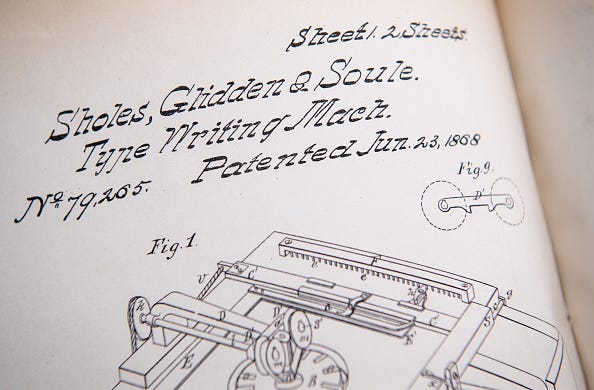The Writer's Almanac from Sunday, June 23, 2013
"Do You Love Me?" by Robert Wrigley, from Earthly Meditations: New and Selected Poems. © Penguin, 2006.
ORIGINAL TEXT AND AUDIO - 2013
It was on this day in 1868 that the typewriter was patented, by Christopher Sholes in Milwaukee, Wisconsin. In 1873, he sold the patent to the Remington Arms Co., a famous gun maker, for $12,000. There had been typewriters before, but they weren't very practical — it took longer to type a letter than to write it by hand. The first commercial typewriter based on Sholes' design went on the market in 1874.
There are a handful of contemporary authors who prefer using a typewriter during their writing process. John Updike used his 76-year-old black lacquered Olivetti MP1 until he died. David Sedaris took his typewriter with him everywhere until surrendering a few years ago to the inconvenience of trying to get it through the airport. Larry McMurtry honored his Swiss Hermes 3000 typewriter in his acceptance speech for Best Screenplay at the Golden Globes in 2006, calling it "a noble instrument of European genius." Paul Auster wrote an homage to his manual Olympia called The Story of My Typewriter (2002).
It's the birthday of the Russian poet Anna Akhmatova, born in a suburb of Odessa in 1889. She was a beautiful, fashionable, 22-year-old woman when she published her first collection of poetry in 1912. The book was filled with love poems inspired by her affair with the then-unknown Italian painter Amedeo Modigliani, and no Russian woman had ever written so frankly about love. Akhmatova became a celebrity overnight.
But within a few years, life in Russia became much more complicated, and Akhmatova had a lot more to write about than love affairs. In her poem "In Memoriam July 19, 1914" — about the start of World War I — she wrote, "We grew a hundred years older in a single hour." After the Bolshevik Revolution, most writers and intellectuals tried to flee the country, but Akhmatova and her husband decided to stay. Her husband was shot in 1921 for allegedly participating in an anti-Bolshevik plot, and the following year, the government informed Akhmatova that she would no longer be able to publish her poetry.
She began working on translations and more or less stopped writing her own poems.
Then Akhmatova's son was arrested by the government. For 17 months, she went to the prison in Leningrad every day to try to get news about her son's well-being. There were crowds of other women there, doing the same thing, and one day a woman recognized Akhmatova as the formerly famous poet. Akhmatova later described the incident, writing, "A woman with bluish lips standing behind me … woke up from the stupor to which everyone had succumbed and whispered in my ear, 'Can you describe this?'"
That woman's question helped inspire Akhmatova to begin writing her 10-poem cycle "Requiem," which many Russians consider the greatest piece of literature written about Stalinist Russia.
Be well, do good work, and keep in touch.®





